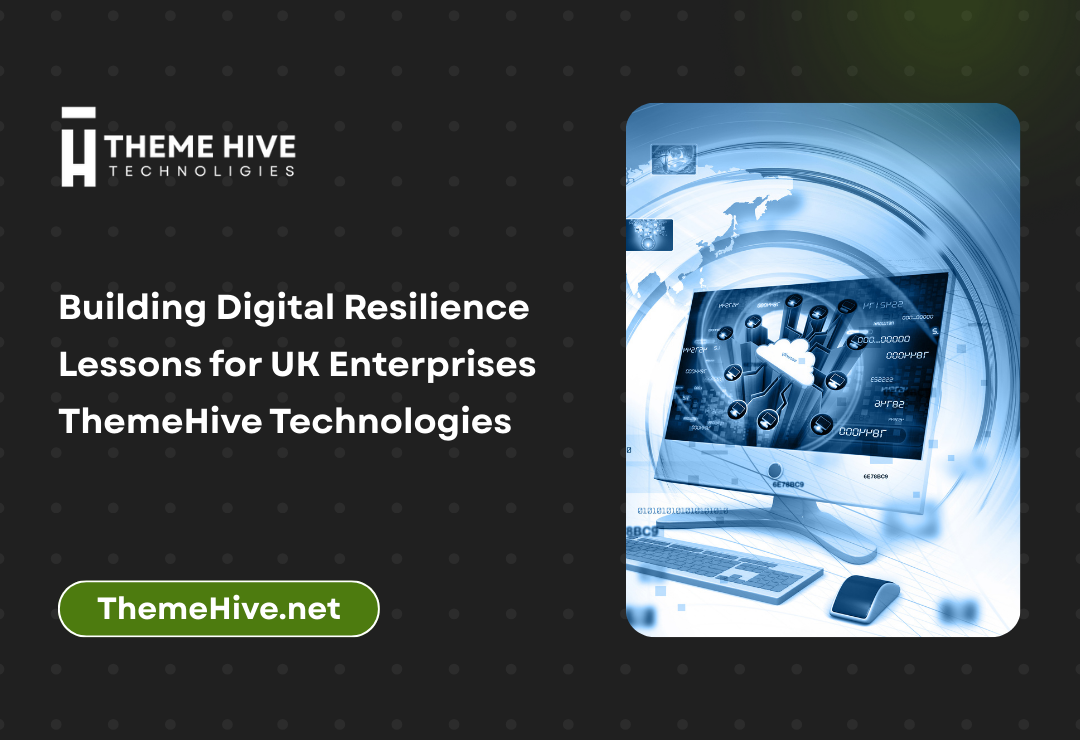In an era of constant digital disruption, UK enterprises face an ever-growing need to strengthen their resilience against evolving cyber threats, operational risks, and technological changes. Digital resilience is no longer a choice; it is a business imperative. Enterprises must build systems, processes, and cultures that allow them to anticipate, withstand, recover from, and adapt to adverse digital events.
This article explores the significance of building digital resilience for UK enterprises, the challenges they face, key lessons learned from past disruptions, and practical strategies for the future. Along the way, we highlight how companies like ThemeHive Technologies and Theme Hive Technologies are guiding organizations through the journey of digital resilience.
What is Digital Resilience?
Digital resilience refers to an organization’s ability to continue operations, maintain trust, and protect data despite disruptions such as cyberattacks, system failures, or regulatory changes. Unlike traditional risk management, digital resilience emphasizes adaptability and recovery in dynamic digital ecosystems.
Core aspects of digital resilience include:
- Cybersecurity Preparedness: Safeguarding against cybercrime and data breaches.
- Business Continuity: Ensuring uninterrupted operations during crises.
- Adaptive Innovation: Using technology to respond to rapid market shifts.
- Regulatory Compliance: Meeting evolving requirements such as GDPR and NIS2.
Why Digital Resilience Matters for UK Enterprises
UK enterprises operate in a competitive, fast-changing environment where digital technologies drive growth. However, these same technologies create vulnerabilities. Building digital resilience matters because:
- Rising Cybersecurity Threats: The UK has witnessed a sharp increase in ransomware, phishing, and supply chain attacks.
- Regulatory Pressure: Enterprises must comply with data protection regulations to avoid legal and financial penalties.
- Economic Uncertainty: Resilience helps organizations remain stable during economic downturns or disruptions like Brexit and global pandemics.
- Customer Trust: Secure and resilient enterprises earn long-term customer loyalty.
- Operational Continuity: Prevents losses from downtime or system outages.
Lessons from Past Disruptions in the UK
1. The COVID-19 Pandemic
The rapid shift to remote work exposed vulnerabilities in IT infrastructures. Enterprises learned the importance of cloud adoption, secure remote access, and agile collaboration tools.
2. Ransomware Attacks
High-profile ransomware attacks on UK healthcare and financial sectors demonstrated the need for strong backup strategies and incident response planning.
3. Supply Chain Disruptions
Global supply chain disruptions highlighted the risks of over-reliance on single vendors. Resilient enterprises diversified suppliers and invested in digital supply chain monitoring.
4. Regulatory Changes
The introduction of GDPR pushed enterprises to adopt stronger data protection measures, serving as a lesson in proactive compliance.
Core Components of Digital Resilience
1. Cybersecurity Frameworks
- Implement Zero Trust architectures.
- Regular vulnerability assessments and penetration testing.
- Continuous monitoring with Security Operations Centers (SOCs).
2. Cloud and Infrastructure Resilience
- Hybrid and multi-cloud strategies reduce dependency on one provider.
- Disaster recovery and redundancy planning.
3. Workforce Preparedness
- Employee training in cybersecurity awareness.
- Flexible work models that maintain productivity during crises.
4. Data Governance and Compliance
- Adhering to GDPR, NIS2, and sector-specific regulations.
- Strong encryption and data classification policies.
5. Digital Innovation
- Leveraging Artificial Intelligence, Internet of Things (IoT), and automation to remain competitive.
- Agile methodologies that allow rapid adaptation to changing conditions.
Challenges Faced by UK Enterprises
- Skill Shortages: A lack of skilled IT and cybersecurity professionals.
- Budget Constraints: SMEs often struggle to allocate sufficient resources.
- Complex Regulations: Navigating the patchwork of compliance requirements.
- Technology Debt: Legacy systems hinder modernization efforts.
- Evolving Threats: Attackers are constantly innovating, making defense challenging.
The Role of ThemeHive Technologies
Enterprises across the UK are turning to partners such as ThemeHive Technologies and Theme Hive Technologies to strengthen their digital resilience. Their offerings include:
- Cybersecurity Services: Threat detection, incident response, and SOC-as-a-service.
- Cloud Migration: Supporting hybrid and multi-cloud strategies.
- Compliance Management: Helping enterprises meet GDPR and industry regulations.
- Business Continuity Planning: Designing recovery strategies for critical operations.
- Digital Transformation Consulting: Enabling innovation while maintaining resilience.
These partnerships allow enterprises to focus on growth while relying on expert guidance for resilience.
Best Practices for Building Digital Resilience
- Adopt a Zero Trust Security Model: Assume no user or device is trustworthy by default.
- Invest in Employee Training: Build a culture of cyber awareness.
- Leverage Cloud Flexibility: Use cloud infrastructure for scalability and redundancy.
- Develop Incident Response Plans: Ensure employees know procedures during breaches.
- Monitor Continuously: Use AI-driven monitoring tools for real-time threat detection.
- Collaborate with Experts: Engage managed IT and security service providers.
The Future of Digital Resilience in the UK
As digital ecosystems evolve, resilience strategies must advance:
- Artificial Intelligence in Security: Automating detection and response.
- Sustainable IT Practices: Ensuring resilience aligns with environmental goals.
- Greater Integration of Cyber Insurance: Financial risk management will be vital.
- Cross-Sector Collaboration: Sharing intelligence between industries and government.
- Focus on Customer Trust: Transparency in data practices will become a competitive advantage.
Conclusion
Building digital resilience is no longer an option but a necessity for UK enterprises. By learning from past disruptions, investing in cybersecurity, modernizing infrastructure, and fostering adaptive cultures, businesses can thrive in a digitally volatile environment. Companies like ThemeHive Technologies and Theme Hive Technologies are empowering organizations to build the resilience they need to succeed in the future.
Internal Links
- Theme Hive IT Agency Home
- About Theme Hive
- Theme Hive Services
- Theme Hive News & Articles
- Contact Theme Hive







